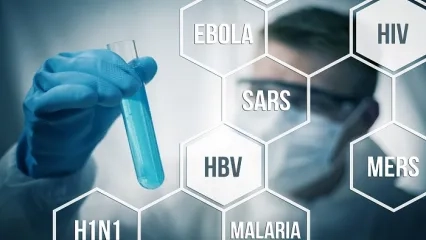Alo Yeditepe
Alo Yeditepe
Swine Flu / H1N1
What is swine flu?
Swine Flu, or H1N1 flu in medical terms, is an outbreak-causing respiratory disease caused by the influenza A virus. Normally swine flu does not spread to humans, it must be mutated in order to pass on to people who come into contact with sick pigs. In the past, the person-to-person spread of the swine flu virus has been reported, but this transmission has been limited.
It is a mutation type of mutated swine, human, and poultry influenza, which gained pandemic characteristics in the world in 2009 and which gained human transmission in the same year. After the vaccine is produced, the rate of spread is reduced, but it can still lead to outbreaks among sensitive people who have not had it or are not vaccinated.
Is the H1N1 flu contagious?
The (H1N1) virus was identified as an infectious and human-to-human spreading virus. With the study conducted by a total of 180 family physicians working in 17 provinces with a high population density from different regions of Türkiye, the number of patients with "Flu-like Disease" among the people who have respiratory tract infection and the samples taken are examined in Public Health Directorates and laboratories.
1072 samples were studied between 28 December 2015-03.01.2016. a viral agent was found.
73 cases H1N1, 39 u Influenza A/H3, 5 i Influenza B were found.
These results show that 62.4% of the influenza strains that are still spreading are H1N1 viruses.
What are the signs and symptoms of H1N1 flu?
The symptoms of swine flu in humans are comparable to the symptoms of human flu.
- Trembling,
- Fever, sore throat,
- Muscle pains,
- Severe headache,
- Dry cough, weakness,
- General discomfort,
- Nausea, vomiting, diarrhea (in children).
Serious illnesses (pneumonia and respiratory failure) and deaths have been reported in the past with the H1N1 flu. Like seasonal flu, H1N1 flu can cause the worsening of chronic health conditions.
How is the H1N1 flu spread?
H1N1 flu is spread through seasonal flu-like pathways, usually through a person-to-person cough or sneeze. Since the flu virus can survive for 2 hours, it continues to spread on the surfaces in contact after touching the mouth or nose.
How is the human-to-human transmission?
Symptoms may be transmitted 1 day before the onset and 7 days later after the onset of the disease.
What should I do to protect myself from the flu? The most important and first thing we need to do is wash our hands and protect our overall health. Adequate sleep is needed.
- Be physically active,
- Manage your stress,
- Drink plenty of liquids,
- Consume nutritious foods.
In addition,
- Do not touch surfaces contaminated with the flu virus.
- Avoid contact with sick individuals.
Is there a treatment for H1N1 flu?
Oseltamivir and zanamivir are effective in treatment. It is necessary to avoid contact with patients and possible cases. It can survive for 2 hours on the surface. Hand washing is important.
The vaccine is protective.
How long is the H1N1 flu virus infectious?
Lasts approximately +7 days with acute onset symptoms.
Incubation period: 1-4 days, average 2 days
Infectious period: 1 day before symptoms, contagiousness lasts for 5 days. Children may be contagious for longer.
What is the risk of contamination on surfaces contaminated with the virus?
May be transmitted by touching the eyes, nose, or mouth after contact with contaminated surfaces or materials. The disease can spread easily with droplets formed in the air by coughing or sneezing. If the contaminated person touches any surface without washing their hands after touching their eyes, mouth, and nose, it continues to infect.
How long does the virus live outside the body?
The virus can survive outside the body for up to 2 hours.
What can I do to protect myself?
Close contact with someone who is sick should be avoided. The vaccine is effective in protecting against the H1N1 flu. The seasonal flu vaccine has a content of swine flu virus (H1N1). Since 2015, 4 influenza vaccines (2 influenza A and 2 influenza B) have been administered.
Risk groups that should be vaccinated:
- Persons aged 65 years and above and those staying in an elderly nursing home,
- Chronic cardiovascular disease, kidney, lung disease, or immunosuppressed persons,
- 6 months to 2 years old,
- Healthcare workers.
Those who should not be vaccinated are those with egg allergies. Pregnant women and those who give breast milk can be vaccinated.
To protect your health
- When coughing, close your mouth and nose (with a handkerchief),
- Wash your hands with soap and water, alcohol-based hand sanitizers are effective (especially after coughing or sneezing),
- Clean surfaces often,
- Do not touch your eyes, nose, and mouth, as this is how the virus spreads,
- Avoid contact with sick people,
- Those who have the flu should not go to work or school but rest.
What is the best way to prevent transmission through coughing or sneezing?
If you are sick, limit your contact with other people as much as possible. Do not go to work or school. Cover your cough and sneeze. Dispose of the used handkerchief in the bin. If you do not have a handkerchief with you when coughing or sneezing, cover your cough and wash your hands. Always pay attention to your hand hygiene. Paying attention to these measures will help prevent the spread of the disease.
Washing your hands
Washing your hands often will help protect you. Wash your hands with soap and water or clean them with alcohol-containing hand sanitizers. It is recommended to wash your hands with soap and water for 15-20 seconds. In the absence of water and soap, alcohol-containing wipes can be used.
When you get sick, avoid as much contact as possible and try to stay at home to avoid infecting other people.
Need immediate support for your child
- Fast and challenging breathing,
- Bluish color of the skin,
- Inadequate fluid intake,
- Fatigue,
- Restlessness,
- Increased symptoms,
- Rashes with fever.
Need for emergency support in adults
- Difficult breathing or shortness of breath,
- Pain or pressure in the chest and abdomen,
- Dizziness,
- Confusion,
- Vomiting.
This content was prepared by Yeditepe University Hospitals Medical Editorial Board.
”
See Also
- Infections Common in Hot Weather
- What is Hepatitis B? What are its symptoms? How is it Transmitted?
- What is HMPV Virus? HMPV Symptoms and Ways of Transmission
- Why Is the Flu Lasting Longer This Year?
- What is West Nile Virus? What are the Symptoms and how is it Transmitted?
- Viral Hepatitis and Prevention Methods
- What Precautions Should Be Taken Against the Cold Epidemic?
- Don't Be Late Fighting Against Diseases
- Antibiotics Kill Beneficial Bacteria, Not Viruses
- What is Hepatitis? What are the Symptoms and Treatment Methods?
- Symptoms and Treatment of Tick Bites
- Summer Infections
- Precautions Must Be Taken Against Loss of Life Due To Infection in Thalassemia
- Information on H1N1 (Swine Flu)
- Summer is Coming... Beware of food poisoning!
- Office Hygiene: The Most Common Areas Where Microbes are Found in the Office
- Our Taboos Affect the Increase in the Number of HIV-Positive Cases in Turkey
- Strep A Symptoms and Treatment
- Do Not Put a Cigarette Butt or Pour Olive Oil or Liquid Soap on the Tick
- Reheat the Food You Cooked Only Once!
- HIV Can Be Hidden for 10 Years without Any Symptoms!
- 290 Million People Live Without Knowing They Have Hepatitis
- Things to Consider When Touching Meat at Eid
- What Is Anthrax Disease?
- The Way to Fight AIDS is to Raise Awareness First
- Still Not Too Late For Flu Vaccine
- What is Rhinovirus?
- Fighting with Thalassemia: Meral Yılmaz
- Thalassemia Spreads from the Mediterranean to the Whole of Europe with Migration!
- Early Treatment of Crimean Congo Hemorrhagic Fever is Vital
- Approximately 3 Million Patients Need Blood Transfusions Every Year in Turkey
- When to Get the Flu Vaccine
- Antibiotics Account For 14% of Prescription Costs
- West Nile Virus Replaces Malaria
- It Is Necessary to Try to Be Healthy in order to Be Protected
- A New Flu Outbreak is Expected Every 10 Years
- 63% of Vector-Borne Diseases are Caused by Lyme Disease
- Experts Warn About Flu Risk
- Mosquito Infection Risk
- Why aren’t Antibiotics Working Any More?
- The World Raises an “Alarm” on Antibiotic Resistance!
- What is COVID-19?
- The Mask Requirement was Removed and the Importance of Social Distance Increased!
- How to Prevent COVID-19 in School-Going Children
- WHO (World Health Organization) Warns for Antibiotic Resistance!
- Who Is Threatened by Monkeypox?
- Ways to Prevent Coronavirus
- Life Returns to Normal with Caution
- What is Monkeypox Virus? What Are the Symptoms of the Monkeypox Virus?
- What is Lyme Disease?
- How to Tell if You Have a Mild Coronavirus?
- Pay Attention to These Rules for COVID-19
- Hand Sanitizer Usage Guide
- The Priority Rule for the Protection from Summer Infections is Hygiene
Alo Yeditepe




